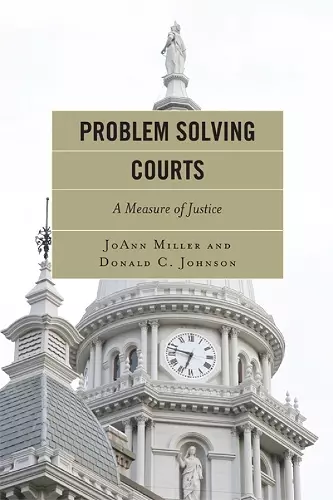Problem Solving Courts
A Measure of Justice
JoAnn Miller author Donald C Johnson author
Format:Paperback
Publisher:Bloomsbury Publishing PLC
Published:16th Jan '11
Currently unavailable, and unfortunately no date known when it will be back
This paperback is available in another edition too:
- Hardback£64.00(9781442200807)

This book offers insights into a transformative criminal justice approach. Problem Solving Courts emphasizes rehabilitation and community connection for offenders.
In Problem Solving Courts, the authors delve into an innovative approach to criminal justice that emphasizes rehabilitation over punishment. This method emerged from the drug court movement of the 1980s and has evolved to include a variety of specialized courts designed to address the root causes of criminal behavior. Judges, along with law enforcement and mental health professionals, engage with offenders in a supportive environment, focusing on treatment and community reintegration. Weekly meetings allow for ongoing dialogue about progress and challenges, fostering a sense of accountability and support.
The book examines different types of problem solving courts, such as community courts aimed at enhancing neighborhood safety and cohesion, drug treatment courts that prioritize addiction recovery, family treatment courts that address child welfare issues, and domestic violence courts that ensure victim protection while holding offenders accountable. Through these models, the authors argue for a shift in perspective regarding how society handles crime and punishment.
JoAnn Miller and Donald C. Johnson, who have firsthand experience in establishing successful problem solving courts, provide a comprehensive analysis of their impact on individuals and communities. They highlight the need for alternatives to incarceration, demonstrating how these courts not only aid in the rehabilitation of offenders but also contribute to the overall well-being of the community. Problem Solving Courts ultimately advocates for a transformative approach to the justice system, emphasizing healing and restoration over retribution.
Miller and Johnson’s Problem Solving Courts is a fascinating introduction and examination of the possibilities and limitations of problem solving courts as 'blended institutions' that seek to reduce recidivism and protect the community by addressing offenders’ underlying behavioral, socio-emotional, and human capital deficits. -- Jeffery Ulmer, Penn State University
Problem solving courts (PSC) have exploded onto the criminal justice scene in the last twenty years....JoAnn Miller and Donald C. Johnson in Problem Solving Courts dig past recidivism studies by reporting their findings from a three-year institutional ethnographic study of three different types of PSCs....The important question they address is, why do some specialty courts seem to work better than others? Miller and Johnson's study helps us understand that the problems faced by PSCs are not just tough-to-reform defendants, but tough-to-reform agencies. * Contemporary Sociology *
The authors present detailed case studies and research showing how the theater of law can provide alternatives to incarceration and end the tragic cycle of recidivism. * Think Magazine *
This book is creative and fresh in its approach. The authors cover the length and breadth of socio-legal studies related to Problem Solving Courts. By including the voices of repeat offenders, classical social scientists, and cultural giants such as Shakespeare, they go far beyond the conventional. This book poses an intellectual challenge to students, legal practitioners, and social scientists to draw upon a breadth of perspectives in their conception of the justice process. The book provides a behind the scenes look at Problem Solving Courts, and is required reading for anyone interested in understanding contemporary jurisprudence. -- Glenn W. Muschert, Miami University, Ohio
“According to Miller, part of re-entry court’s success was the enthusiasm of everyone involved—for instance, a doctorate student at Purde who was on the team started a reading program for the recently released prisoners”
“Miller said she could count on one hand the number of participants who re-offended. And in those cases, they either violated probation or program rules or committed minor crimes, such as one man found intoxicated and asleep in his vehicle”
ISBN: 9781442200814
Dimensions: 232mm x 155mm x 17mm
Weight: 431g
288 pages